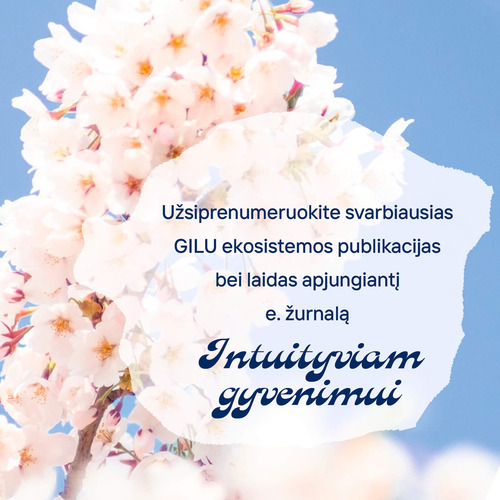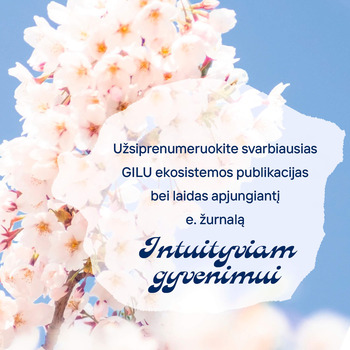Publications
- Home
- Publications
- Educational leader Iveta Apine: there is a real wave of burnout, people are realising that if you want to make a difference, you have to do it now
Educational leader Iveta Apine: there is a real wave of burnout, people are realising that if you want to make a difference, you have to do it now
2023 02 28LRT.lt
Iveta Apine, an educational leader, facilitator of systemic relationships and constellations, and teacher from Latvia, notes that last year saw a massive wave of burnout. It has affected both personal fortunes and the businesses she advises.
"People who have been planning to change something in their lives for some time realised last year that they can't wait any longer and have to make a change right now. The ideal life that some had built up in their heads as a vision of the future has been shaken up dramatically by the change in the geopolitical situation," says Apine.
Systemic Constellations is one of the methods of practical psychology used to solve problems in different areas of human life, including in business organisations and other structures. This method makes it possible to identify the interrelationships between people, events, environments, relatives and their impact on a person's or a business's existence. Being in the here and now and having a sense of intuition is crucial in this method. However, Ms Apine points out that it is necessary to distinguish where it comes from.
- How did you discover and become interested in systemic relationships and constellations?
- I became interested in constellations primarily as a client, as someone who needed help in her personal life. I wanted to resolve difficulties in my marriage. To my surprise, I discovered something that was completely unfamiliar to me but had a huge impact on my life.
First of all, the Constellations gave me hope. This does not mean that I started expecting someone to solve my problems for me. I gained hope when I felt that I had found the direction I needed to go, I had a chance to solve it.
I had already had experience with training and group work, so it was natural for me to integrate constellations into my work. I had been studying systemic relationships for many years, but the turning point came when my husband and I went to a German psychotherapist and teacher of systemic constellations, Bertha Hellinger. Getting to know him, to see how he works, how he talks about systemic relationships, the family system, had a huge impact on me and changed my life.
In the end, not only did it help me to solve the problem for which I came to the Constellations, but it gave me a new paradigm of how to work and how to live. Now I have founded the Centre for Systemic Constellations in Riga, and I travel and consult people all over the world.
I like to say - love your problems, they can lead you down the most interesting paths to finding ways out and solutions.
- Are systemic constellations suitable for all people?
- I don't recommend this method immediately after the death of a loved one. The soul is already overwhelmed with strong experiences. Give yourself time. Constellation is particularly effective when a person has tried everything to solve their challenge, their problem, and nothing has worked. I do not recommend going just out of curiosity - it is not an authentic solution. We are not naturally designed to look at something painful just out of curiosity. Once you open Pandora's box and release what is in it, you can't put it back - you have to deal with it, you have to resolve it.
- Leaders-in-training have a keen sense of the times and the issues and challenges that are most pressing for people. So how would you identify what is most pressing for people in this period?
- I would divide the people who come to me into two broad groups. The first ones come already, as I say, with symptoms. They are suffering and they can clearly see that something is wrong. The other big group are the creators, the owners of organisations who are trying to visualise a better life for themselves and for others. These two groups are very different in their thinking and in the issues they raise.
One trend that has been very evident in the last year is that people have been experiencing burnout. This shocked me and made me look for the reasons why this is happening. Of course, the pandemic and then the war that broke out nearby contributed to that. All of this touched not only our personal lives, but also the wider field in which we are all connected, such as our collective war traumas, unresolved, unhealed and re-emerging family experiences.
People who have been meaning to change something in their lives for some time realised last year that they cannot wait any longer and have to make a change right now. The ideal life that people had built up in their heads as a vision of the future has been shaken considerably by the change in the geopolitical situation. We have realised that we can no longer live like children who hope for a better future in spite of what is happening around them.
Such realisations have led people to focus on the essentials of life - health, relationships, fulfilment, work. Now they come to ask how they can live a better life and be in good relationships, and they ask questions in a much more mature way.
Ten years ago, many people were obsessed with how to build a big house, how to buy a luxury car, how to influence their environment - a trend that I hardly notice any more.
Business creators in this period have been and still are thinking a lot about how to be more useful in a broader context, looking for new solutions, naturally moving from linear thinking to more complex thinking. Systemic linkages are complex thinking. Those who thought they could only achieve better results and growth by working harder have changed their minds. Business builders are becoming more open-minded and broader thinkers, and I think that is very cool.
- It seems to be a really good time for organisations that operate on Lively Systems principles - that is, cyclical, constantly renewing, putting people first.
- Those companies that think bigger and have already done their homework, have embraced the model more openly, are really thriving now, and that gives the system more credibility, more space. The differences between those structures that are 'built' on a culture of fear, a hierarchy, exist and will continue to exist, but the differences between them and more humane systems are becoming more and more marked. Nevertheless, in Latvia the term "lively organisations" still sounds esoteric to many.
- Your point that perfection is artificial stuck. Could you explain it?
- When you construct perfection, you take away life; it is just an artificial, false idea, an illusion. Whereas the natural process is alive and therefore perfect.
- How would you define what intuitive life is?
- Intuition comes from many sources, so the key is to distinguish between them. It's not easy, it requires a lot of awareness. Intuition can also come from our learned patterns of behaviour: we can intuitively, unconsciously repeat the decisions of our experience, what we just remember, and that is the biggest trap. The real intuition that nurtures us comes from the here and now, from the moment, from the state of the moment.
Another source of intuition that can also be misleading is our imagination. People sometimes say: I tried, I failed, it must not have been meant to be. I always advise people to be careful with their interpretations. Maybe from the here and now something is not happening, but if we put more effort into it, we might see ourselves in a different perspective, with a much higher potential. Or maybe it didn't happen because we stole someone else's dreams or ideas?
So how can we be sure where our intuition comes from? When can we question it? When we feel that we are already in the process, in the flow, and we can feel it in our body. It is what I trust the most. When it says no, it means no. The body is a system that does not lie.
- How can we integrate the body as a source of intuition in our lives as much as possible? Sometimes it can seem like it's just holding us back, it has a lot of needs.
- Exactly - when we integrate the body into our life processes, we become slower. The body makes us less efficient, less productive. Sometimes it seems - it would be easier without it. Here we are sitting in one place, but our thoughts can travel through time, space, etc.
Moreover, many of us have experienced events that have caused us to disconnect from our bodily senses. Sometimes we don't let it feel at all and think that this is life. The purpose of every adult life is to live with an open heart, to be in touch. This cannot be done if we are disconnected from our body and only rely on our mind to understand who we are. So more and more I try to "listen" to my body.
- Another one of your themes is female leadership. We often hear discussions about whether this female/male distinction is valid at all. What is your opinion?
- I very much believe in the potential of female leadership, but systemically we have a problem here (smiles). If we only talk about female leadership, we exclude male leadership. When I first started working on this topic, I called my female friends into a circle - I had the idea that there are certain topics that we cannot discuss when men are together. Later I realised that this was not true - it was just that I or we women were not ready for it.
This idea also changes the perception of women's leadership. Our society in general is becoming more and more gender-complex, and the distinction based on gender is a bit artificial. But that does not mean that there are not specific problems, issues that are only related to women - there are. Do women leaders act differently? Yes, often. But why not combine female and male leadership rather than separating them? Observations are only more powerful, more valuable, when taken in a wider context.
https://rb.gy/ucvijg










